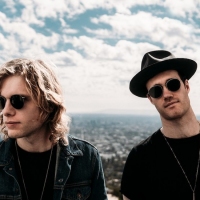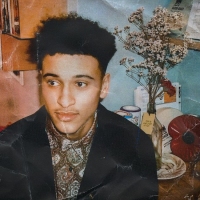 Bob Moses, on building a record from desire and DJingOn their new concept release, the LA-via-Vancouver duo use a continuous mix as a stepping stone for reflections on desire.
Bob Moses, on building a record from desire and DJingOn their new concept release, the LA-via-Vancouver duo use a continuous mix as a stepping stone for reflections on desire.

Aminé, and finding balance amongst the limbo of loss
He’s one of the most exciting newcomers of the last five years, and with Limbo, Aminé’s ready to step into the next phase – just so long as he can still indulge that trademark energy.
It’s twilight on the West Coast, and Aminé is restless.
“I actually enjoy running around and like having to do all the things,” he says from a white Adirondack chair in his yard. “The excitement and the hassle of that is what I miss, you know what I mean? It's always fun to just have a 6AM day and it doesn't end till 9PM… it's just fun.” It’s not a hunger that shows in tapping toes or fiddling fingers, but even as Aminé revels in some of his biggest successes to date, there’s something lost in this virtual victory lap. “I honestly just miss regular life, that's really it.”
Going off the title alone, Limbo sounds like a record for the times, the kind that might’ve been cobbled together over the last few weeks and named for our collective aimlessness. Any Aminé fan could tell you that that’s not how the man works, and their torturous wait – whether from his 2017 debut, Good For You; his 2018 “LP/EP/Mixtape/Album” OnePointFive; or his February single, Shimmy – speaks to his honed, deliberate approach to music. In his telling, there’s no real rush, except for the one he still gets on release day.
“It’s somewhat a relief,” he says of the belated release, “because putting it together was hard. It's definitely the most challenging album for me to compile... it was the hardest songwriting I've ever had to do, as well.” Aminé paints the making of Limbo as a series of visions and revisions, with piecemeal elements combined so gradually, you’d have to squint to make out the seams. “I didn't make the second half of Riri, where the beat completely switches, until a year after we'd made the song,” he tells me, mind reeling as he calls back to the alternate mixes and might-have-beens. “All the songs just have like 50 different versions with different beats behind them, different production, other lyrics, random things… having that time gave me the freedom to do that.”
In another time, such patience would be unremarkable, but in the ever-competitive hype economy, restraint is a conscious approach. It allows those songs to breathe, giving them a chance to evolve into the best versions of themselves, taut, vivid and brimming with charisma. They’re sometimes heady but always fun, unafraid to tackle encroaching gentrification but equally willing to declare the rap game as his for the taking. That deft balance is courtesy of the man himself and, over the past few years, Aminé’s gone through the very same changes, finding his footing in the in-between.
It was on DR WHOEVER, the opening of OnePointFive, that Aminé sunk into the therapist’s sofa and unloaded on his ever-elusive happiness, the march of time, those rosy memories of teenage concerns and the suicidal ideation that he’s grown enough to tackle openly. “These intros ain't meant to be bangers / They meant for you and me,” he crooned to nobody in particular, finding catharsis in those admissions and intimacy in the audience. On Limbo opener Burden, which confides as it critiques, Aminé refreshes that tender lede with a new, impassioned lease: “you got to make it better, or things won't change.”
That’s the thing about Limbo – Aminé’s been in it for a minute. We’re not yet three minutes in before he assures us that he’s “in limbo, but [he knows] the ropes,” and what follows runs the gamut of that space, considering his Woodlawn origins alongside his Los Angeles lifestyle, his dashed relationships alongside the unbroken bond of family, and the realities of racism alongside the clique of friends that move with him. Limbo is an interstitial space, one that bridges youth and maturity, and as Aminé waxes on the flowering fruits of his labour and his new reality – “my fantasy,” he admits – you can’t help but feel the project sees off that haze of uncertainty.

That untethered stretch in the mid-’20s might be a little confusing, but that doesn’t mean it can’t be fun. “I went for my birthday, I went there mainly for relaxation, I didn't work at all,” he says of Jamaica, which has recently become a favourite getaway. “I was writing, you know, here and there,” he concedes, “but I wasn't there for work. I went there with all my friends and we were playing tennis there, and that's where I came up with the idea for the Compensating video.” That seems productive in and of itself, and so Adam returned – this time, as Aminé – to put some time into the record. “That's when we made Easy,” he explains, “I was there at the G-Jam Studios with a lot of other artists and producers, that was just one of the songs I happened to make.” Jamaica became the spot, just as Hawaii had been for OnePointFive, for a reason as simple as it is inarguable: “Why not? I just really wanted to go to Jamaica and make some music.”
If Jamaica was met with a “why not,” returning to his Oregon home took a stronger case, one he sees as finally setting the record straight. The music video for his Ol’ Dirty Bastard-flipping single, Shimmy, sees him make a triumphant return to Portland, a city with which he’s always had a complicated relationship. “News outlets and TV shows based in Portland try to act like Black people don't exist there,” he begins, his almost-exclusively Black take on the Pacific Northwest an unambiguous push against that erasure. “We're a community that is not represented in the world, we're kind of on the hush hush. If you're not from Portland, you don't really know about Northeast Portland and the Black people who live there, and you never think that of Portland.”
It’s far more than just an illuminating clip, speaking to Aminé’s own time in a city that neglected his experience and discouraged his art. “If I didn't have the internet, I definitely would never be here, because growing up in Portland they shut down hip-hop shows non-stop,” he adds moments later, waxing over the region’s “super white” indie rock canon.
“Making a video like Shimmy was important because I was like, ‘this city is just as mine as it is yours!’ It is just as much my city as it is yours. I just wanted to make sure that Shimmy was a video that let people know I'm from Portland, and this is my neighborhood, and this is where I grew up and... we live here too.”
If Limbo works to patiently unpack Aminé’s Portland upbringing on tracks like Burden, Woodlawn and Becky, it channels a simpler love for another titanic childhood force: Kobe Bryant. His death in January fell moments before the record’s initial release, and in that delay – during which time, Aminé marched in protest of George Floyd’s killing – his memory was woven into Woodlawn, where Aminé mourns him “like a dad”; Fetus, where the Mamba is remembered as a father to aspire to; and Kobe, where friend and comedian Jak Knight recalls the news. “It weirdly, like, fast-forwarded my maturity,” he admits, “I felt like a piece of my childhood go… and I’m 26!”
“People have just been tagging me on my own song all day,” he says on what would’ve been Kobe’s 42nd birthday. “You know, I don't think much of it, I kind of try to not think about it honestly… I don't wanna be sad, you know?” The rawness is still to pass, but when it does, Aminé’s ready to remember him in his own way. “I feel like he's had an effect on a lot of people and especially me,” he muses, “so to be able to, in the future, show my kids his games and things like that, I think that's what's going to be.”
A lifelong inspiration though he was, Kobe’s death hit as an epochal loss, the kind of event that ricocheted around the world prompting grief and understanding. His is the presence that’s long coursed through Aminé’s bars, but those same rhymes were honed in the company of another late friend. “Groggs is... far from just being an artist, as a person, is just the sweetest guy ever,” Aminé tells me of Stepa J. Groggs, the late Injury Reserve emcee, whose sudden death in June shook his friends, family and many fans. “No matter how raunchy or crazy or funny his lyrics are, he's a teddy bear, he's just so nice, and it killed me to find out about it. That really, really hurt me.”
Groggs’ verse on Fetus, the Limbo track that marks their third collaboration in as many years, painfully plots a loving familial future that won’t come to pass. “I really was excited for him to be able to be here to see Fetus come out, and to be able to see Injury Reserve get bigger,” he shares, calling himself “their biggest fan.” “It's hard to put these words together when someone dies, because that was honestly the first time I had a close friend die,” he admits, soberingly. “I've never had like a best friend of mine, like a good, good homie of mine, pass away.”
“I think his legacy will live on, because Nathaniel and Parker are very, very, very talented and resilient,” he says of Groggs’ Injury Reserve family, trusting they’ll keep their spirit intact and “make sure it stays original.”
It’s been seven years since a young Portland emcee bought out a sponsored DatPiff placement and pushed his first mixtape onto streaming services. It was on that project, Odyssey To Me, that Aminé dared to dream big, lining his arrival with images of luxury and excess before awaking to his Woodlawn bedroom. Gazing at the wall, he considers his chances, casting his fantasies as a book and the audience as authorial aides. “I'm trying to climb the mountain to success with the best / And it's going to be hard to find a fucking rope,” he stoically rhymes, the track passing without as much as a braggadocios claim. There’s a great sense of sincerity in there, a genuine estimation of the dream and its reality – one that, as of Limbo closer My Reality, Aminé’s finally living out.
“I think we all, as artists coming up, have that doubt in our head where we're just like, 'maybe if things don't work out for me, what the hell am I going to do?' You know, me even doing this now is just still crazy,” he laughs, putting this whole thing down to “a series of events that [he] didn't see coming.” Odysseys do tend to be like that.
“I think it's going good, man,” he beams, reflecting on the voyage. “I'm excited to be able to do what I'm doing for a living, that is honestly the best part about it all, that I get to literally do my dream as my way of income. Musically, I'm just hungry… there's so much more for me to accomplish,” says Aminé, assuring me he’s for real by admitting he doesn’t often get this excited. “The odyssey to me is going as planned,” he announces. “It's definitely something I'm working towards myself… it's kind of just like a constant thing, it'll never end, you know?”
It once seemed “hard to find a fucking rope,” but as Aminé makes a dash for the summit of success, it turns out he “knows the ropes” better than most. Limbo is a project that’s seen him through Jamaican holidays and Portland homecomings, relationships past and families future, inherited mantles and considered legacies, and fallen heroes and lost friends. It’s seen him channel the idols who helped set him on this path, from the oft-invoked Jay-Z to the soul-sampling, Mama-inspiring Kanye West. It’s seen him make some plans and reschedule others; find a place in the world and face down the racism that threatens to take it away. In the hands of somebody else, that might be a panicked listen, but with Aminé at the helm, the fun never really flags.
I doubt that’ll be an issue, at least for the time being. “It's definitely made me feel a bit more confident in myself,” says Aminé, reflecting on Limbo’s rapturous response. “I have the confidence of an artist and I can definitely get through it, and when I'm on stage, I turn it on crazy and all that, but personally as Adam, this has definitely helped me just grow into even believing in myself so much more,” he says, beaming as he goes. “Putting out Limbo kind of has helped me so much... it's therapeutic in itself.
“Now that it's out, it just feels so good, man,” he offers with a contented sigh. “To have it finally in the world for people to enjoy is all I wanted since jump.”
Aminé's new album Limbo is out now via Republic Records / Universal Music AU.
Follow Aminé: FACEBOOK
 Bob Moses, on building a record from desire and DJingOn their new concept release, the LA-via-Vancouver duo use a continuous mix as a stepping stone for reflections on desire.
Bob Moses, on building a record from desire and DJingOn their new concept release, the LA-via-Vancouver duo use a continuous mix as a stepping stone for reflections on desire.
 Introducing Tayo Sound: UK street busker, vision of the futureIt’s been a big two years for Reading teen Tayo Oyekan, who’s gone from hustling neighbourhood busker to international recording artist.
Introducing Tayo Sound: UK street busker, vision of the futureIt’s been a big two years for Reading teen Tayo Oyekan, who’s gone from hustling neighbourhood busker to international recording artist.